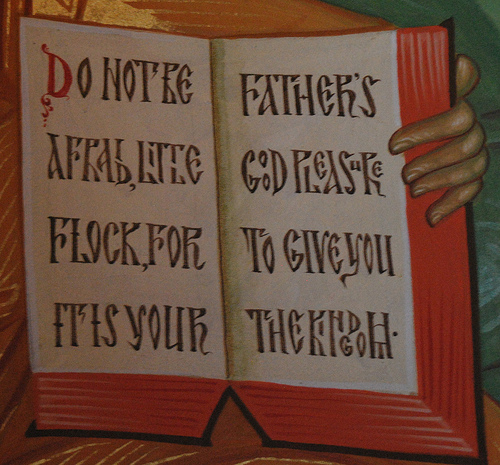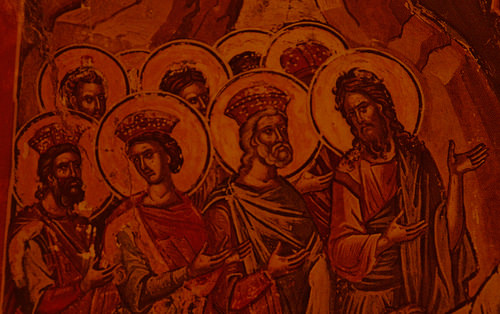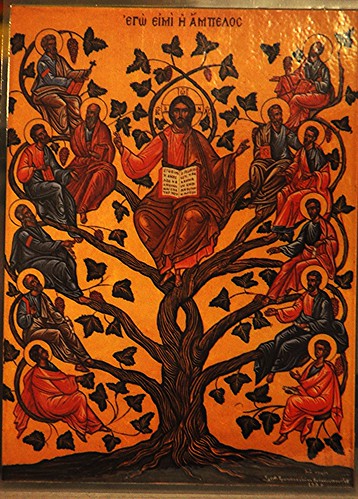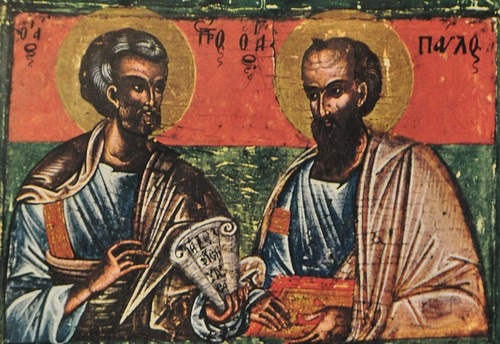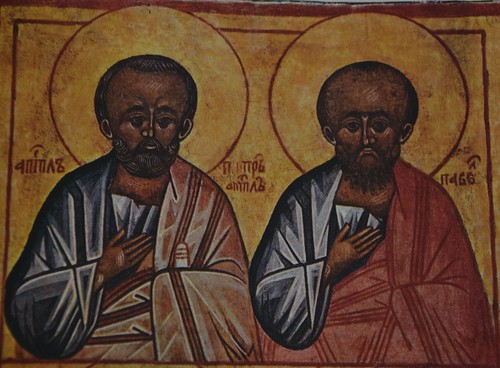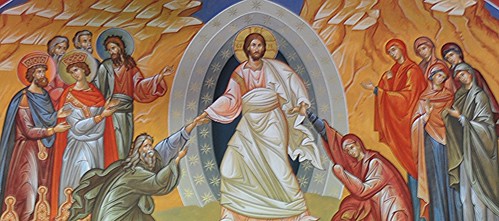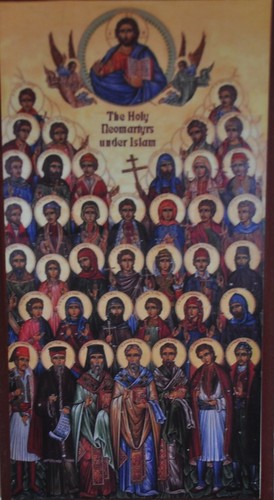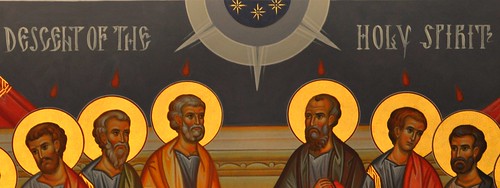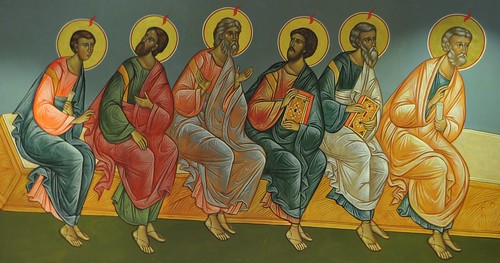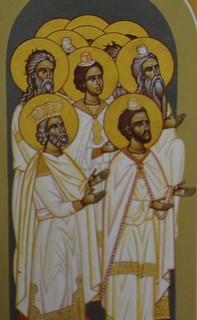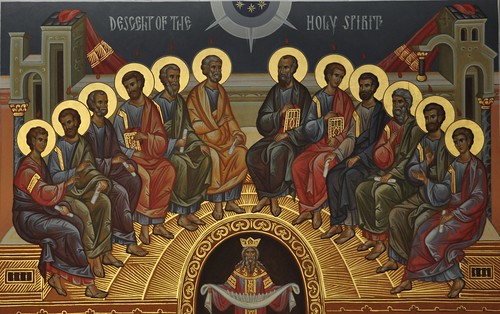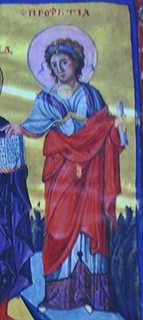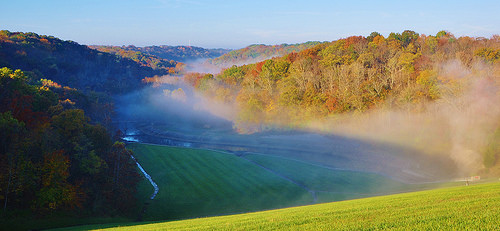The Epistle reading for the Sunday of All Saints is Hebrews 11:32-12:2. In it we are being given a narrative in which to understand the heroic accomplishments as well as the suffering and martyrdoms of God’s chosen people. The author of Hebrews is telling us that the Old Testament story is not complete – at least not apart from us! Their story continues beyond their time and flows into our time and incorporates us into the narrative.
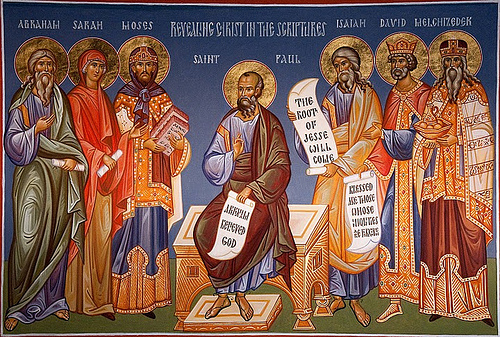
Here is the text of the Epistle for All Saints:
And what more shall I say? For time would fail me to tell of Gideon, Barak, Samson, Jephthah, of David and Samuel and the prophets— who through faith conquered kingdoms, enforced justice, received promises, stopped the mouths of lions, quenched raging fire, escaped the edge of the sword, won strength out of weakness, became mighty in war, put foreign armies to flight. Women received their dead by resurrection. Some were tortured, refusing to accept release, that they might rise again to a better life. Others suffered mocking and scourging, and even chains and imprisonment. They were stoned, they were sawn in two, they were killed with the sword; they went about in skins of sheep and goats, destitute, afflicted, ill-treated— of whom the world was not worthy—wandering over deserts and mountains, and in dens and caves of the earth. And all these, though well attested by their faith, did not receive what was promised, since God had foreseen something better for us, that apart from us they should not be made perfect.
Therefore, since we are surrounded by so great a cloud of witnesses, let us also lay aside every weight, and sin which clings so closely, and let us run with perseverance the race that is set before us, looking to Jesus the pioneer and perfecter of our faith, who for the joy that was set before him endured the cross, despising the shame, and is seated at the right hand of the throne of God.
The text is presenting these men and women of Hebrew history in a very particular light – creating a narrative about them, their heroics, their hope and vision even in the face of suffering. AND by saying they were not made perfect apart from us, invites us to join that narrative, and make it our own and carry it forward. We are woven into their story, and they become a living part of our lives. This is of course important in helping us continue to be faithful in our day; for like these our spiritual ancestors we find that we too are looking forward to a future fulfillment of God’s plan. The saints of the Old Testament were looking forward to the day of Christ’s coming, and we are awaiting the fulfillment of the kingdom of heaven, so we continue to look to an eschaton not yet realized.
The Saints of the Old Testament are part of a narrative that stretches from their day right through our current century. Their story makes no sense apart from our own. Our current story is part of a narrative that stretches back to the beginning of humanity and reaches into the Kingdom of God which is to come. Thus what we experience in a life time is but a portion of the much longer narrative of God’s creation. Our experience is a glimpse of the narrative, but not the entire picture. We always have to keep that in mind when we struggle with life in a given moment, on a given day, or through a lifetime. As long as our life might be (even if we live to a Methuselahian age – nearly a millennium!), our life is but a small portion of the narrative of creation – a paragraph in a chapter in a book in a library.
There are always many narratives running through our our minds and hearts. These narratives exist on different levels, with varying degrees of influence, which enter our thinking at different periods of our lives. Some are meta-narratives, involving many people – being American for example is such a narrative which teaches us certain hopes and dreams and a way to interpret the world. Some narratives are given to us through family or genetic identity – being Slavic-American or Latino, growing up on the wrong side of the tracks. Other narratives are quite personal – I’m lovable, talented, or unwanted. Narratives may in fact not represent a true vision of reality, but they do shape our experience of reality and of how we constitute reality. We may come to believe along the way that “nobody likes me” – that may be far from reality, but it colors our experience of reality and does then come to effect how we constitute reality. Such narratives may be true or false, real or imagined, good or bad – and we are not always aware of them, nor of how they influence us. It is possible to become aware of them (takes great mindfulness!) and we can reject some of them and replace them with other narratives – thus conversion, repentance, forgiveness are all possible. We can change the narratives guiding the way we see the world – the way we constitute reality.
While there are always several narratives running through our minds and hearts, we can also choose to embrace a meta-narrative which can come to override or interpret our many internal narratives. Or sometimes the competing narratives in our brains run into conflict and cause cognitive dissonance – which sometimes we choose to live with, and sometimes becomes so uncomfortable that we change narratives.
Sometimes we cannot find a meta-narrative which makes sense of all the other narratives or of a particular narrative. That can cause us to seek out that meta-narrative, to seek for some truth to help us deal with all else that we think, feel, believe, experience. The seeking itself can become the meta-narrative which guides us. We realize there is mystery, that searching and seeking may not find answers, but only help us frame questions.

Some meta-narratives help us gain insight into ourselves, and into reality itself. How we understand ourselves as humans or as Christians are really meta-narratives which help us cope with life and constitute reality.
For me, the Orthodox Christian meta-narrative is very attractive, but I realize that it is sometimes in competition with other powerful narratives – the American meta-narrative for example which gives us certain myths about America which can be powerfully attractive and wonderful but which are in direct opposition to the Gospel narrative. Some people even blend these competing narratives, blurring the distinctions and assuming they are the same narrative.
Meta-narratives in the world are always changing, but sometimes they change faster and we become more aware of the narratives or the changes that are occurring in them. Right now in the world several meta-narratives are in the process of change. Islam actually is constituted by several competing narratives that are literally at war with each other and the rest of the world. America’s meta-narrative is in the process of changing as the world itself changes. Brexit, terrorism, nationalism, exceptionalism, China, etc, are all changing the world’s narratives. Some find these changes terrifying and they want to go back to a time when they felt safer – so they try to grasp onto a world that is passing away. They are not really grasping reality, but just the meta-narrative they embraced as true or which comforted them and made sense of the world. Politicians try to feed the meta-narratives they believe are most alluring to people. Like the narratives themselves, what the politicians say may not be reality, but they resonate with the voice already at work in people’s minds.

The Apotheosis of George Washington
For us as Christians, we have a meta-narrative that is always focused to the eschaton – drawing us forward to the Kingdom of God. The world’s meta-narratives are ever changing, but Jesus Christ is the same yesterday, today and forever (Hebrews 13:8). This Gospel meta-narrative is supposed to simultaneously strengthen us, comfort us, inspire us, challenge us, give us hope and make sense of the world around us.
For the form of this world is passing away. I want you to be free from anxieties. (1 Corinthians 7:31-32)
Yet I am writing you a new commandment, which is true in him and in you, because the darkness is passing away and the true light is already shining. (1 John 2:8)
